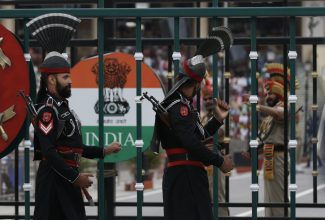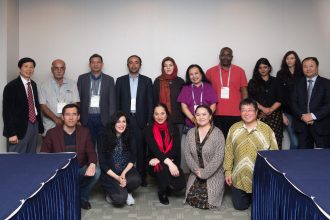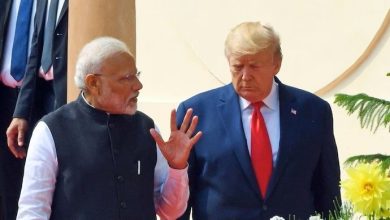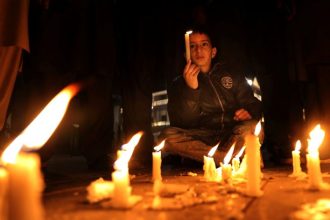Himalayan Activist Sonam Wangchuk Detained Under National Security Law in India
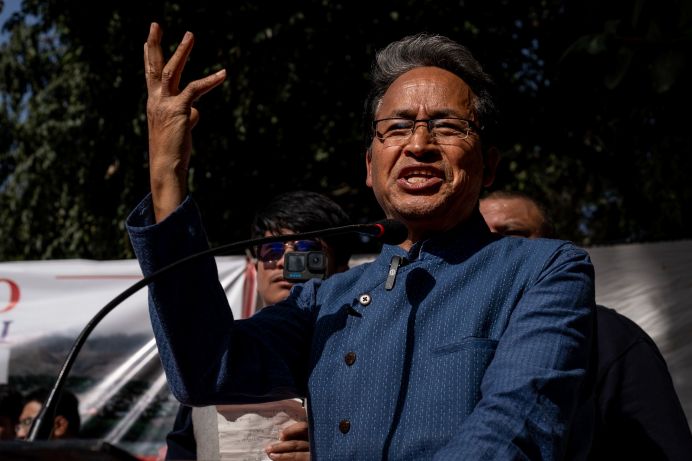
By Gunjeet Sra
The arrest of Sonam Wangchuk, India’s pioneering climate activist and education reformer, has ignited a debate over democracy, dissent, and the future of Ladakh — a fragile, strategically vital Himalayan region where environmental and political stakes collide.
NEW DELHI: The arrest of Sonam Wangchuk, one of India’s most celebrated climate activists and educational reformers, has cast a long shadow over Ladakh, the Himalayan frontier he has spent decades defending.
Wangchuk was detained under the National Security Act (NSA) on September 26, 2025, a law that allows authorities to hold individuals for up to a year without trial. The arrest has raised serious questions about democracy, dissent, and the future of one of India’s most strategic and environmentally fragile regions.
To many around the world, Wangchuk is a visionary, the engineer-turned-educator behind solar-powered schools, artificial glaciers, and grassroots innovations that have earned him international recognition.
Wangchuk is best known for his innovative work in education, sustainable engineering, and climate adaptation in Ladakh. He founded SECMOL (Students’ Educational and Cultural Movement of Ladakh), an alternative school that emphasizes practical, hands-on learning and empowers students from remote Himalayan villages to address local challenges. Wangchuk also pioneered artificial glaciers and ice stupas—man-made conical ice structures that store winter meltwater and release it gradually in spring, providing irrigation for crops in the arid region.
In addition, he has designed green, solar-powered schools using local materials, promoting environmental sustainability and self-reliance. His work has inspired national conversations about education reform, and he was reportedly the inspiration behind the popular film “3 Idiots.” Internationally, he has been recognized with awards such as the Rolex Award for Enterprise for his efforts to combine engineering, ecology, and education to empower local communities in high-altitude, environmentally fragile regions.
Home to roughly 302,000 people, Ladakh is India’s second least populous Union Territory. With a population density of just 2 people per square kilometer, it is sparsely populated, but its geopolitical importance is enormous, bordering both China and Pakistan.
After New Delhi revoked Jammu and Kashmir’s semi-autonomous status in 2019, Ladakh became a federally governed territory without a legislature. Many locals now fear the loss of land, identity, and fragile ecosystems.
On September 24, 2025, demonstrations in Leh calling for greater autonomy and inclusion under the Sixth Schedule of the Constitution turned violent. Government buildings were attacked, vehicles set ablaze, and security forces opened fire, killing four people. Authorities accused Wangchuk of inciting unrest.
On September 26, 2025, he was arrested and transferred to Jodhpur Central Jail in Rajasthan. At the same time, his NGO, The Students’ Educational and Cultural Movement of Ladakh (SECMOL), lost its foreign funding license under India’s Foreign Contribution Regulation Act (FCRA).
Wangchuk’s wife, Gitanjali Angmo, rejected the allegations, saying he was being scapegoated to “build a false narrative.”
Rahul Gandhi, leader of the opposition in India from the Congress party condemned Wangchuk’s detention, demanding Sixth Schedule protections for Ladakh by saying that its people and culture are “under attack.” Civil society groups like Himalaya Niti Abhiyan have condemned the government’s “repressive” tactics, while Ladakh’s own Leh Apex Body and Kargil Democratic Alliance are leading protests, turning Wangchuk’s struggle into a nationwide call for dignity, rights, and autonomy.
The NSA allows preventive detention for up to a year if authorities consider someone a threat to national security or public order. While intended for extraordinary circumstances, critics argue the law has often been used to suppress dissent.
Some past examples include detaining anti-citizenship law protesters in 2020 and journalist Kishorechandra Wangkhem in 2021 for social media posts critical of government policies. According to Meenakshi Ganguly, Deputy Director, Human Rights Watch’s Asia division, “The use of NSA against Wangchuk is emblematic of India’s shrinking democratic space. Preventive detention is being used not for imminent threats but to silence inconvenient voices, “
Security concerns amplify the tension. After the 2020 Galwan Valley clash, where 20 Indian and four Chinese soldiers died, India reinforced its presence in Eastern Ladakh. 68,000 troops and 90 tanks were airlifted, with 15,000 additional soldiers deployed. The deployment exceeded 50,000 troops, more than the civilian population of Leh district.
Ladakh is also at the frontline of climate change. Its glaciers are melting rapidly, threatening water security for the Indus basin and millions downstream. Since the Ice Age, Ladakh’s glacier area has shrunk by 40 percent and its volume by 25 percent. Without constitutional safeguards to protect the region’s fragile ecology, experts warn of looming climatic crises.
Wangchuk’s arrest has resonated across Indian civil society, especially among climate and tribal rights NGOs. SECMOL’s FCRA suspension mirrors actions taken against Greenpeace and Amnesty International India, which scaled back operations under government pressure.
Internationally, analysts see Wangchuk’s detention as indicative of India’s balancing act: asserting central authority while trying to maintain global climate credibility.
“From a foreign policy standpoint, Ladakh is not just an environmental hotspot but a geopolitical flashpoint. Arresting its most prominent activist risks alienating local populations at a time when China looms just across the mountains.” – Michael Kugelman, Wilson Center
European observers have voiced concern as well:
“Democracies are judged by how they treat dissenters. Sonam Wangchuk’s detention under a draconian law sends the wrong signal.” – Ulrich Delius, Society for Threatened Peoples
Negotiations between Ladakhi leaders and New Delhi continue, but trust remains fragile. For now, one of India’s most admired grassroots innovators sits behind bars, his fate uncertain.

